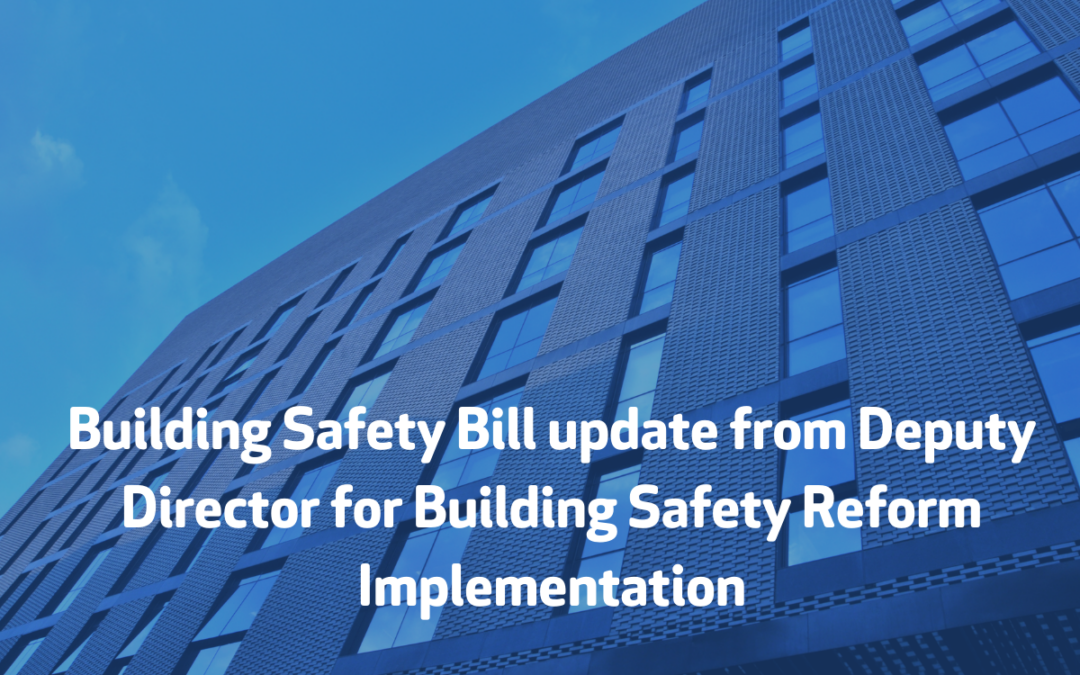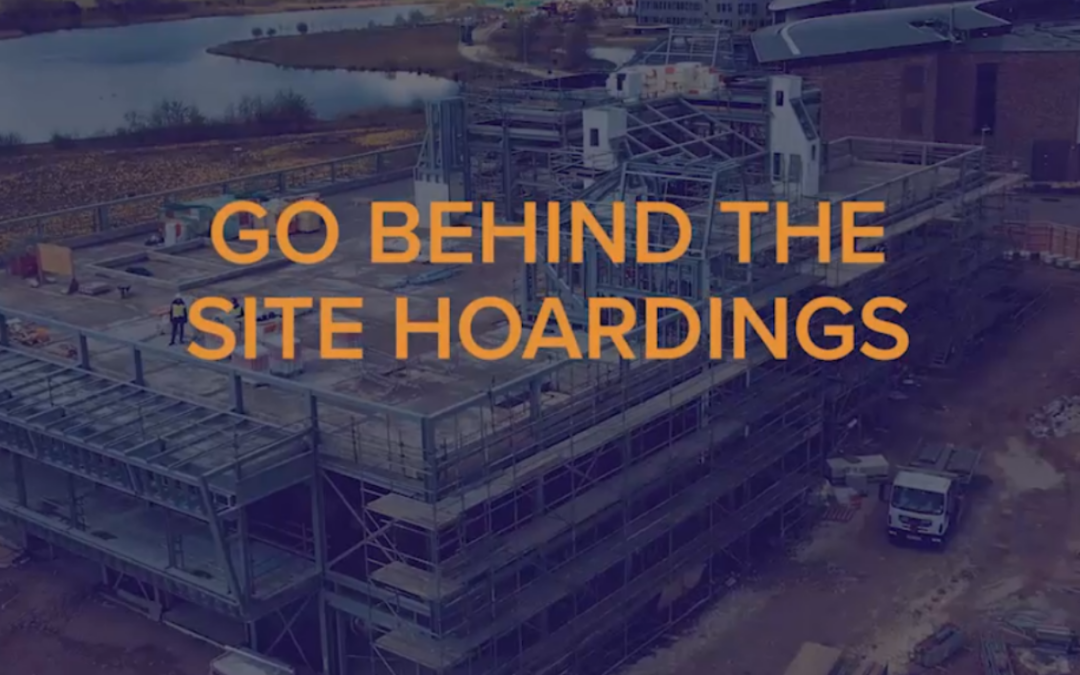
by Clair Mooney | 28 Apr, 2022 | Main News Feed
The impact of war in Ukraine: The Government has announced new measures to support Ukraine under its free trade agreement, which include reducing all tariffs on goods imported to zero and removing all quotas. It has also strengthened sanctions against Russia, with tariffs increased by up to 35 percentage points and the list of products facing import bans expanded to include silver and wood products.
The latest statement issued by the CLC Product Availability Group confirms that ‘the impact of the war in Ukraine is only beginning to be felt by UK construction’. Sanctions against Russia have led to reports of nickel prices doubling, which affects the price of stainless steel, whilst rising energy and raw material costs are continuing to drive up prices, particularly for energy‐intensive products like steel, cement and glass.

by Clair Mooney | 28 Apr, 2022 | Building Safety Act
Cladding remediation update
The latest figures published by DLUHC show that, of the 483 high‐rise residential buildings identified to have unsafe ACM cladding:
- Remediation work has been fully completed on 316 (65%)
- Work has been completed and is awaiting Building Control sign off on a further 56 (12%)
- Work has started on 80 (17%)
- Of the remaining 31 (6%), 16 have a remediation plan in place, 14 are intending to remediate and one doesn’t have a clear remediation plan.
The Building Safety Fund for the remediation of unsafe non‐ACM cladding systems received 2,827 registrations, 30% of which have now been invited to apply for funding, with 6% in the process of having their eligibility assessed.
Funding for cladding remediation
Michael Gove, Secretary of State for Levelling Up, Housing and Communities, has reached an agreement with developers that will see them commit a minimum of £2 billion to fix fire‐safety issues with their own buildings. To date, 36 of the UK’s largest homebuilders have pledged to fix all buildings over 11 metres that they have played a role in developing over the last 30 years, and Gove has urged other developers to sign up, stating that those who refuse to do so could be prevented from building and selling new homes in the future. Alongside this, the Government has confirmed plans to extend the Building Safety Levy to be paid by developers on all new residential buildings in England, which is expected to raise up to £3 billion over the next decade to support remediation works.
Gove has also written to the product manufacturing sector, expressing his disappointment at its failure to make a public funding commitment and reiterating that the Government will do ‘whatever it takes’ to make sure they are held to account through the powers established in the Building Safety Bill.
RICS updates EWS1 Forms
RICS has updated its EWS1 form to confirm that all assessments of external walls should now be carried out in accordance with PAS 9980. Whilst the Government has stated that buildings below 18 metres do not require an ESW1 form to be completed, RICS guidance continues to advise lenders to ask for EWS1 forms on buildings of six storeys or fewer where ACM, MCM or HPL panels are present.
For a summary of the Building Safety Act 2022 click here

by Clair Mooney | 26 Apr, 2022 | Sustainability
The Competition and Markets Authority has produced its Green Claims Code to help businesses understand how to communicate their green credentials while reducing the risk of misleading consumers. The Code focuses on 6 principles that are based on existing consumer law, these are:
- claims must be truthful and accurate
- claims must be clear and unambiguous
- claims must not omit or hide important relevant information
- comparisons must be fair and meaningful
- claims must consider the full life cycle of the product or service
- claims must be substantiated
These bear similarity to our sector’s Code for Construction Product Information which emphasizes the need for clear and robust statements about the performance and impact of a product. This applies to green claims just as much as to other performance claims. This is an area we may need to visit in more depth to ensure green claims in our sector are robust. If you are making a claim about the environmental impact of a product then it should be on the basis of the standard EN 15804 to produce an Environmental Product Declaration (EPD). This considers impact through the whole lifecycle of a product.

by Clair Mooney | 26 Apr, 2022 | Main News Feed
FIS is continuing its support of the 2022 Inspiring Change Awards, that were introduced in 2016 to recognise companies working in the construction, infrastructure, and built environment sectors.
There is no charge to enter, and attendance at the Conference & Awards Ceremony is also free of charge.
Creating open and inclusive workplace cultures in which everyone feels valued, and respects colleagues, is recognised as key to business success. Becoming a finalist or winner in the Inspiring Change Awards is a great way to raise your company profile as they highlight organisations that understand the broad scope of diversity, nurture a culture of Fairness, Inclusion and Respect, and have taken active steps to promote equality of opportunity in the workplace and wider community.
The Inspiring Change Awards are part of the FIR Programme, and are part-funded by CITB.
In 2022, Awards will be presented in the following categories:
- Inspiring Change in the Workplace
- Inspiring Change in the Community
- Inspiring Change in Education
- Inspiring Change: Project Award
- Inspiring Change: SME Award
- Inspiring Change: FIR Inspiration
The deadline for entries is the close of business on Friday 13 May 2022.
This year the Awards Ceremony will be incorporated into a one-day Inspiring Change Conference, which will be held on 6 July 2022 at No. 11 Cavendish Square, London W1G 0AN. The conference will bring together a range of inspirational speakers from diverse backgrounds, including industry stakeholders and representatives from a range of sectors. The Awards Ceremony, which is free to attend, is sponsored by CITB and the individual awards will be sponsored by major clients and other stakeholders.
For more information and details on how to enter, please visit www.inspiringchangeawards.com or e-mail inspiringchangeentries@ceca.co.uk

by Clair Mooney | 22 Apr, 2022 | Building Safety Act
The Construction Products Association has formally responded to Secretary of State Michael Gove regarding the building safety and cladding remediations.
- Secretary of State addresses CPA in open letter, thanking the CPA and its members for support of agreeing that leaseholders should not face bills for remediation costs
- The Minister highlighted that he is unhappy of ‘lack of movement’ on agreements
- CPA Chief Executive expresses disappointment that no agreement has yet been reached and is open to providing further assistance where required
- The CPA outline where measures need to be put in place so that there is clear, working actions to meet a desirable outcome
On 13 April 2022, the Minister for DLUHC wrote a letter addressed to CPA Chief Executive Peter Caplehorn bring to a close current talks around the remediation of building safety and cladding. In the letter, the Minster acknowledges the work undertaken by CPA and its members and the reasons as to why the remediation works is a lot more challenging than his original letter outlined.
After several months of discussions between DLUHC and members of the construction products and housebuilders sectors Mr Caplehorn expressed his professional disappointment that an agreement has not been reached. In the letter sent today to the Minister, he has highlighted where further clarity is required from the Government over lack of details for the work required. Additionally, Mr Caplehorn has stated that many Construction Product Association members have voluntarily agreed to pay for any costs because of defects from their own funds as part of the House Builder’s Remediation programme.
Mr Caplehorn said:
“Our members do understand the urgency of finding a solution and have been working hard with us to try to find a suitable formula. We should stress however that many are troubled by the lack of detail in terms of scope and definitions for the work and the lack of support from valuers, insurers, and the mortgage sectors.”
Additionally, the CPA has politely asked the Government to refer to the recommendations from the Select Committee report, most notably these three points:
1. To establish a clearer understanding at the building level to avert further confusion and delay for leaseholders
2. Involve other sectors of the industry in the discussion because in the design, procurement, construction, and maintenance of any building there will have been a complex set of interactions leading to the final built asset.
3. The CPA have long advocated (prior to these specific discussions with DLUHC) that a wider remit of works must be considered – beyond simply cladding and insulation – to ensure that every one of the buildings in question is made fully safe for leaseholders. If this entire discussion around funding is to gain the support it requires, then both the Government and industry must be doing all they can to ensure that all building safety defects are addressed in any remediation programme.
The CPA also feel it is wrong for the Minister to characterise the position of those highlighted in his letter as making “excuses” and “not taking action”, as our members and other manufactures have been proactive in their approach to come to an amicable solution with this situation.
Finally, the CPA and the stakeholders involved are keen to learn on the proposals that Government would like to put forward as we await their response. In the meantime, we will carry on working on the reform and cultural change in the industry to benefit the homes of the future in a safer environment.

by Clair Mooney | 20 Apr, 2022 | Main News Feed
The Finishes and Interiors Sector (FIS) is pleased to announce that Philip Thomas has been co-opted to its executive board.
Philip is Business Development Manager at Smith Building Systems and has worked within the partitioning, aluminium extrusion and building products field for over 20 years.
Philip’s current role as Business Development Manager for Smiths Building Systems affords him the opportunity to be involved in many aspect of the business including branding, web development, safety, technical specifications, product development, improvement and design. This wide-ranging role will bring a vast amount of industry experience and knowledge to the FIS Board.
A recently new FIS member, having joined in 2020, FIS Chief Executive Iain McIlwee said:
“An inherent strength of FIS is the engagement we get from our membership and particularly the willingness of members to step up and support our team, providing leadership and expertise via the Board. FIS only exists to try and help create the right conditions for the good companies to win, paramout to this is members scrutinising what we are doing is helping and helping us to understand what more needs to be done. Philip brings a wealth of experience and enthusiasm and are looking forward to working closely to continue to grow the FIS in every way.”
Philip said
“I feel honoured to have been asked to join the board of the FIS, It has long been considered as the go to resource when it comes to the building industry. To be working alongside so many incredible and well respected people from all parts of the industry makes me feel very proud and humbled. I am excited to be able to help continue the amazing work the FIS does especially when it comes to partitioning which will hopefully continue to benefit of the entire industry”.
For further information or for any questions please contact the FIS at info@thefis.org or call 0121-707-0077.
You can find the current Board members at https://www.thefis.org/about-us/board/

by Clair Mooney | 20 Apr, 2022 | Skills
The Department for Education and SDN are currently planning what support is put in place for employers over the coming months to help understand, prepare for, and host industry placements.
Industry placements are a fundamental part of the government’s reforms to technical education (T Levels). It gives students a period of structured time in the workplace (315 hours / 45 days), developing real skills and making a meaningful contribution to the organisation.
A quick survey has been designed to capture views and insights from employers, to plan the right support at the right time in 2022 and beyond. It is crucial that this support responds to your challenges and support needs as we emerge from the pandemic, and as T Levels are rolled out.
We’d really appreciate your input into this, it should take no more than five minutes to complete: https://www.surveymonkey.co.uk/r/LGYTCF8
George Swann, FIS Skills and Training Lead said:
T-Levels are new courses which follow GCSEs and are equivalent to 3 A levels. These 2-year courses, which launched September 2020, are for 16 to 19 year olds and have been developed in collaboration with employers and businesses so that the content meets the needs of industry and prepares students for work, further training or study. T-Levels offer sixth form students a mixture of classroom learning and ‘on-the-job’ experience during an industry placement of at least 45 days. This survey is looking to identify the support employer will need to host a T-Level student, things like, training and/or support for coaching and mentoring, financial support, health and safety information and/or legal responsibilities.

by Clair Mooney | 11 Apr, 2022 | Health and Safety
HSE is currently inspecting woodworking businesses to ensure dutyholders know the established health risks associated with the industry.
Each year, around 12,000 people die from work-related lung diseases linked to past exposure to hazardous substances at work. This includes inhalation of wood dust that can cause occupational asthma and, in the case of hardwoods, sinonasal cancer. These deaths are preventable if exposure to the risks is effectively controlled.
Inspectors will check that:
- woodwork is planned correctly to minimise risk
- adequate control measures are in place to protect workers’ health
Ventilation, protective equipment and appropriate guarding are some of the measures businesses should consider as Britain’s workplace regulator is carrying out inspections to protect the respiratory health of workers.
From April, health and safety inspectors across Great Britain will be visiting business within woodworking industries such as sawmilling, manufacture of composite boards, and carpentry, as well as other industries where wood dust exposure can occur.
Woodworking industries have the potential for high incidence rates of occupational asthma and work-aggravated asthma caused by worker exposure to inadequately controlled wood dust in the workplace.
Inspectors will be looking for evidence that employers have considered the control measures required to reduce workers exposure to wood dust, that workers understand the risks of exposure to wood dust, and effective control measures have been put in place to protect workers from harm. Inspectors will take enforcement action when necessary to make sure workers are protected.
HSE’s head of manufacturing David Butter said: “Around 12,000 workers died last year from lung diseases linked to past exposure from work, with thousands more cases of ill-health and working days lost. Wood dust can cause serious health problems. It can cause asthma, which carpenters and joiners are four times more likely to get compared with other UK workers, as well as nasal cancer. Our campaign aims to help businesses whose workers cut and shape wood to take action now to protect their workers’ respiratory health.
“Through visiting wood working businesses, our inspectors are able to speak to a range of dutyholders and look at the measures they have in place to comply with the guidance and protect workers from respiratory diseases such as occupational asthma and nasal cancer.
“Businesses can act now to ensure they are complying with the law by ensuring the control of wood dust at source by fitting and using extraction on machines. Ensuring they fit and use guards on machines to protect fingers and hands and ensure those that use the machine to understand the risks and how to control them. Checking that guards are well adjusted will minimise danger and ensure that dust capture remains effective.
“Our inspection initiative aims to ensure employers and workers are aware of the risks associated with the activities they do. They must recognise these dangers and manage these risks through reducing exposure. Dutyholders need to do the right thing, for example, through completing a risk assessment, ensuring workers are trained, appropriate guarding is fitted and adjusted correctly, and reducing exposure using local exhaust ventilation (LEV) and using suitable respiratory protective equipment (RPE) to protect workers, where required.”
For the latest advice and guidance visit www.hse.gov.uk/woodworking/; for more information on the programme of inspections follow the campaign on Twitter at @H_S_E or on Facebook @hsegovuk. You can also join the conversation at #WorkRight and sign up for HSE’s e-bulletin here.

by Clair Mooney | 8 Apr, 2022 | Building Safety Act
In January, the Government set out the three principles underlying its new approach to tackling the building safety crisis:
- We must make industry pay to fix the problems for which it is responsible.
- We must protect leaseholders.
- We must restore common sense to the assessment of building safety risks, speeding up fixing the highest risk buildings and stopping buildings from being declared unsafe unnecessarily.
- We have been listening carefully to stakeholders and parliamentary debates, and are now introducing a number of further changes to reinforce our new approach. Please see a summary of the key updates below.
Protecting Leaseholders
We are exempting more leaseholders from paying any costs for remediation. In addition to exempting all leaseholders in buildings over 11 metres from cladding costs, qualifying leaseholders with properties valued at less than £175,000 (or £325,000 in Greater London) will now be protected entirely from all remediation costs, including those related to non-cladding defects. We are also protecting leaseholders who own a small number of properties, providing that those owning up to three properties qualify for all leaseholder protections in the Bill (up from two properties previously). We are making it easier for leaseholders to pay their capped contribution towards non-cladding remediation, where their building’s developer, freeholder or landlord cannot be traced or cannot afford to pay the full costs.
We are now allowing leaseholders to spread their contribution payment over ten, rather than five years. We are also ensuring that remediation, where required, is conducted quickly, preventing leaseholders being trapped for years in unfinished buildings. Remediation Orders will be available to set out the remediation work required, and the time period in which it must be completed by the landlord of a building. Taken together, these changes mean that many leaseholders across England will now pay nothing for any remediation works; and of those remaining, no one will pay more than £10,000 (£15,000 in London) for remediation works across their lifetime.
Ensuring Industry Pays
We have been clear that those who developed defective buildings or produced and sold dangerous cladding and insulation must pay to fix the problems they created. The Secretary of State will be updating shortly on progress in discussions with industry to ensure they self-remediate their buildings. In the meantime, today we are providing further detail on how the Government will impose a solution on the industry to the need to pay for buildings to be remediated, if they do not agree voluntarily.
These include powers to block developers from starting work even where they have planning permission, and to stop new buildings being signed off as fit for use. We do not want to use these powers, but the industry should be in no doubt that we will not hesitate to use them should it become necessary. We are also strengthening the tools available to compel developers and construction products manufacturers to pay their share of remediation costs. New Remediation Contribution Orders will be available to compel developers, partnerships and limited liability partnerships, and landlords to pay for remediation, preventing them from hiding their liability behind complex company structures. These Orders will also be able to require developers of defective buildings to reimburse leaseholders for costs they have already paid out. We are also creating new causes of action to compel construction products manufacturers to pay to put right buildings that have been compromised by their products, further reducing the costs for which leaseholders might become liable.
The Future Safety Regime
Finally, we have listened carefully to where leaseholders have noted concerns about the structure of the future safety regime outlined in the Building Safety Bill – particularly where decision-making power is concentrated in the hands of freeholders and managing agents, and not the residents who live in a building and know it best. To that end, we are:
- Removing the duty to appoint a Building Safety Manager, ensuring there is flexibility in the regime to enable Accountable Persons to set the most appropriate arrangements for their buildings and residents, and removing the unnecessary cost a BSM could impose on leaseholders in high rise buildings.
Removing the separate Building Safety Charge, recognising the need to protect leaseholders from another additional charging infrastructure.
Requiring the Building Safety Regulator to invite disabled representatives onto its residents’ panel; ensuring they have a strong voice in the regime as those among the most vulnerable in the event of a building fire.
Enabling resident-managed buildings to appoint a professional director to support them in meeting their building safety duties.
Additional Amendments
There are several other smaller changes that will nonetheless help to further improve the system. These include removing insurance requirements on Approved Inspectors, to help unblock the sector; strengthening the inspection powers for the Building Safety Regulator; and ensuring that we can require longer warranties.
These amendments further strengthen the robust package of measures we have already introduced to ensure that those responsible finally put right the buildings they made dangerously; that the burden for fixing historic issues is shared more fairly; and that leaseholders are firmly protected from the egregious costs they currently face. We would like to thank you for your continued engagement with us on this important agenda, and I’m sure you would like to discuss the above in further detail. We will make sure we create space on our next agenda, or if you’d prefer, the team can put in a slot before the Easter holidays. If you plan on responding publicly to the amendments tabled, please do share your response with the department at ExternalAffairs@levellingup.gov.uk
Responding to this statement FIS CEO Iain McIlwee stated:
“The Building Safety Bill is to be welcomed and the emphasis on future works and how the process of construction should evolve is pretty much what we have been calling for for years. However mechanisms to manage legacy issues must evolve quickly and vitally with the support of Government. This is essential to avoiding the inevitable avalanche of blame that businesses (including many SMEs) will face.
Whilst Polluter Pays is a simple political statement it is a much more complex moral and legal argument. Of course, we have to be accountable for our past deeds and leaseholders should absolutely be protected in every way, but amends to the Bill focus on blame, but it is light on the mechanisms to manage the myriad of contractual disputes that could emerge through the supply chain.
Construction disputes are typically multi-faceted, often complicated by shared responsibility and always worse if there is not a clear paper trail. We need to look to reasons behind and lessons learned from the implementation of the Construction Act to ensure the unintended consequences don’t unravel great progress being made and decimate the sector (creating a shockwave that will impact construction as a whole).
Whilst the Bill extends the legacy liability periods for construction, this is not matched with a similar responsibility for those that were part of our risk management equation such as insurers. Looking forwards it recognises the need to change, but when it comes to legacy, it simply doesn’t reflect that, at times, the system itself was failing many of those working in it and that contracts were often signed under duress and do not match the reality on the ground.
We will continue to work with Government and colleagues in the CPA and CLC to try and find a fair and proportionate approach, but it is vital in doing this that we unite the supply chain and create an environment that doesn’t facilitate the creation of a whole new opportunistic “PPI Claims” type industry and favour those that can (or historically could) afford the best lawyers. We must ensure that the blame doesn’t land disproportionately on those never set up to succeed by failings elsewhere and the polluters are genuinely held to account, not those it is easiest and most convenient to blame.”

by Clair Mooney | 7 Apr, 2022 | Skills
The Institute for Apprenticeships and Technical Education (IfATE) have published the findings from the construction route review. The report sets out how apprenticeships, T Levels, Higher Technical Qualifications (HTQs), and further training will keep pace with the sector’s fast-evolving skills needs, drive up building safety standards, and play a vital role in changing perceptions and working methods around sustainability and mental health.
The report highlights equality and diversity, digital skills needs, and modern methods of construction as further key principles that will guide the design of apprenticeships, T Levels, and technical qualifications.
IfATE can also confirm that the route name for the sector will be expanded to ‘Construction and the Built Environment’. This better reflects the occupational standards contained in the route and the terminology used by the sector as well as further and higher education partners.
There is intention to review the Occupational Standards and Apprenticeship Standards for Plasterer and Interior Systems Installer at the same time possibly bringing both Employer Trailblazer groups together. The review the 99 standards available for construction and the built environment will take place over the next 18 months. FIS will publish information as and when it becomes available.

by Clair Mooney | 7 Apr, 2022 | Main News Feed
National Insurance (NI) contributions have now risen by 1.25% for employees in Class 1, 1A, 1B or 4, as well as Class 1 employers. This increase will remain until 5 April 2023, before contributions revert to 2021/22 levels. The Chancellor also confirmed that the NI threshold will increase to £12,570 from 6 July 2022.

by Clair Mooney | 7 Apr, 2022 | Main News Feed
Build UK has announced that the next Open Doors will take place from Monday 13 ‐ Saturday 18 March 2023. Members are encouraged to start thinking now about how they can get involved. Open Doors is a fantastic way for young people and those looking for a change of career to find out what the industry has to offer by going behind the site hoardings and seeing the diverse range of opportunities available.
Last year, 96% of visitors rated their experience as ‘excellent’ or ‘good’, with three out of four more likely to consider a career in construction after their visit, demonstrating the impact of Open Doors on recruiting the next generation. Build UK has published a Countdown to Open Doors 2023 detailing the key dates for your diaries, starting with a meeting for Open Doors Coordinators on Thursday 16 June.

by Clair Mooney | 7 Apr, 2022 | Main News Feed
The
latest information from Builders’ Conference shows that 490 contracts worth £5.8 billion were awarded in March. Whilst the number of contracts increased for the third month in a row, the value dipped again but was only just below the monthly average for the past year (£6.1 billion). 69% of all the contracts awarded by value were in the private sector. Overall, there were 161 housing projects worth £1.9 billion (34%), the largest of which was a £350 million project to build 30 residential units with a swimming pool and gymnasium in Westminster; 62 office projects totalling £1.1 billion (19%); and 57 education projects worth £567 million (10%).
The number of tender opportunities (359) was slighter higher than the previous month (352) but still 43% below the monthly average for the past year.

by Clair Mooney | 7 Apr, 2022 | Insurance
Companies from across the industry are being asked to take part again in what was, last year, the biggest ever review of construction’s growing professional indemnity insurance crisis.
The survey was carried out last year in response to firms from across the industry reporting sharp increases in premiums for PI insurance, while also seeing stricter curbs on the levels of cover.
Over 1,000 firms responded to the survey last year and findings included:
• Premiums had increased nearly four-fold at last renewal, having doubled the year before;
• Although most respondents said that less than 5% of their work related to high rise residential buildings, almost one in three were unable to buy the cover they wanted or needed; and
• Over 60% had some form of restriction on cover relating to cladding or fire safety and over a quarter of respondents said they had lost jobs as a result of inadequate PII, with one in three unable to carry out necessary cladding remedial work if they wanted to.
The Construction Leadership Council is seeking an even greater response this year to continue to provide government with data to support the construction industry’s request for help in this area, particularly among the SME sector and to address the slowing pace of necessary remedial work.
The survey is entirely confidential and companies from across the built environment are encouraged to participate at: https://www.surveymonkey.co.uk/r/7CJMDG8
Construction Leadership Council Professional Indemnity Insurance Group lead Samantha Peat said: “The construction industry is heading into another difficult period with the cost of energy and building supplies increasing and our sense is that the problems around PII cover for cladding and fire safety are no better.”
“We are continuing to engage with the UK Government and insurers to find ways to help businesses that could otherwise face an uncertain future due to the nature of their PI renewals. We want businesses from across the industry to give us their views – whether you are affected or not – to help us shape the way we prepare a response from the whole sector.”
CLC chair Andy Mitchell said: “We have seen over the course of the pandemic that our industry can work together effectively to tackle the problems facing the construction sector. Given the feedback from across the sector about the difficulties faced by companies in obtaining PI insurance and the beneficial output from the previous survey’s responses, I strongly encourage companies to contribute to this year’s survey.”
The survey will be live until 29 April 2022. Industry-level details of the results will be published by the Council and will be used to inform ongoing work to support the sector.

by Clair Mooney | 6 Apr, 2022 | Main News Feed
The City of London Corporation has unveiled a new Skills for a Sustainable Skyline Taskforce which will look at defining and addressing skills gaps around the construction, retrofit and maintenance of low carbon commercial buildings in Central London boroughs.
The taskforce will run for three years and will be chaired by Deputy Chairman of the City Corporation’s Policy and Resources Committee, Chris Hayward. City Property Association (CPA)’s Chief Executive, Charles Begley, will serve as Deputy Chair.
FIS Chief Executive Iain McIlwee has a place on the Strategy Steering Board, which will support the Taskforce Chair, Chris Hayward CC, and Taskforce Deputy Chair, Charles Begley, in shaping the Taskforce’s strategic outputs and influence. Working in collaboration, they will ensure that the Taskforce addresses skills gaps relating to low carbon commercial buildings across Central London.
It comes in response to the findings of a poll of over 100 industry professionals which revealed:
- 91% said the commercial built environment sector lacks sufficient skilled workers to achieve net zero targets;
- 80% believed a lack of workplace diversity is an issue for the sector; and
- 87% agreed that there is a growing ‘green skills’ gap in the commercial built environment.
The taskforce will support the aims of the City Corporation’s radical Climate Action Strategy which commits to net-zero carbon emissions across the City Corporation’s operations by 2027, and to support the achievement of net zero for the Square Mile by 2040.
It will bring together leaders from across the commercial built environment, including representation from local authorities, central Government, employers, industry bodies and training providers.
Chair of the Skills for a Sustainable Skylines Taskforce and Deputy Chair of the City Corporation’s Policy and Resource Committee, Chris Hayward, said:
“Central London urgently needs a larger skilled workforce to decarbonise its commercial buildings and this taskforce will lead the way in finding solutions to fill this skills gap.
“We must work at pace to attract new talent as well as upskill and reskill the existing workforce as we look to meet our ambitious climate action goals.
“The areas which we have identified as having the greatest scope for improvement are the full development lifecycle, including design, retrofit, construction and maintenance.”
Deputy Chair of the Skills for a Sustainable Skylines Taskforce and Chief Executive of the City Property Association, Charles Begley, said:
“Advances in technology and innovation are opening up a wider range of job opportunities within the built environment, with the drive towards greater sustainability being embedded from financing to fit-out, as well as the long term operation of a building. However, there is evidence of a growing skills gap which threatens to impede progress in achieving London’s net zero carbon targets.
“We need to understand the barriers in attracting the diverse workforce the industry requires, and find solutions to help promote the reskilling and upskilling of existing workers, whilst raising career awareness amongst Londoners, particularly those from underrepresented demographic backgrounds.”
The taskforce’s Strategy Steering Board, which will be responsible for defining the overall strategy, influence and outputs, is made up of the following 15 industry leaders:
- Bola Abisogun OBE, Founder & Chairman, DiverseCity Surveyors
- Tim Balcon, Chief Executive Officer, Construction Industry Training Board
- Julia Barrett, Chief Sustainability Officer, Willmott Dixon
- David Frise, Group Chief Executive Officer, Building Engineering Services Association (BESA) and Member of Executive Group, Actuate UK
- Martin Gettings, Vice President – Portfolio Management, Real Estate, Brookfield
- Alison Gowman, Trustee, Trust for London
- Emma Hoskyn, UK Head of Sustainability, JLL
- Sir Stuart Lipton, Co-Founder and Partner, Lipton Rogers
- Carol Lynch, Chief Executive, Construction Youth Trust
- Iain McIlwee, Chief Executive Officer, Finishes and Interiors Sector (FIS)
- Fiona Morey, Pro Vice-Chancellor (Compulsory and Further Education), London South Bank University
- Benjamin O’Connor, Director, New London Architecture
- Stephen Pomeroy, Founder and Chief Executive, BECG
- Hannah Vickers, Chief of Staff, Mace
- Danna Walker, Founder, Built By Us
After 2025, the taskforce is expected to share the research and lessons learned with other UK regions which have high concentrations of commercial buildings – including Birmingham, Cardiff, Manchester and Glasgow.

by Clair Mooney | 4 Apr, 2022 | Main News Feed
2022 is set to be another busy year for key updates and changes to Employment Law, including the introduction of the long-waited ‘Employment Bill’ – which is set to be the biggest review of workplace employment rights in over 20 years. FIS Associate Member Citation has put together an exclusive guide, including the Employment Bill, backdated holiday pay for self-employed workers, and the end of self-isolation.
Download your copy at https://tinyurl.com/fiselupdate22
FIS member benefit
If you’d like to chat about how Citation can help with the HR and Health & Safety side of your business, just give them a call on 0345 844 1111, or fill in their call-back form and they’ll get right back to you. Please quote ‘The Finishes and Interiors Sector’ when enquiring to access your member benefit and preferential rates.

by Clair Mooney | 1 Apr, 2022 | Skills
FIS and The Worshipful Company of Plaisterers have joined forces to expand on the Plaisterers’ Training Awards, which traditionally covered plastering and drylining, to encompass the wider finishes and interiors sector. The new Training Awards will now recognise outstanding individuals and contributions made to recruiting, training and developing people in plastering and interior trades.
Commenting on the expansion of the awards, FIS President Helen Tapper and Member of The Worshipful Company of Plaisterers Industry Committee said:
“When looking at the skills shortages that have impacted our sector in recent times, it often belies the effort that businesses, training providers and individuals are making. FIS and the Plaisterers are both committed to encouraging people to join the industry and a focus on continuous learning and development.
“People talk about competence and that is vital, but so too is pride in what we do – our work is the stuff that makes structures and shells into homes, hospitals, workplaces and inspiring educational settings. The people that do this are skilled craftspeople and more needs to be done to recognise this, both within and beyond our sector. We have a proud tradition, but a bright future too and this initiative is about two of our key institutions working together to help us to identify, celebrate and learn from the people who are building this future.”
The awards categories will acknowledge individuals, employees, students, apprentices, independent training providers and colleges who have made an exceptional contribution to learning and development in the sector.
The 2022 award categories are:
- Student of the Year – Plaisterers Award for Plastering Trades
- Student of the Year – FIS Award for Interior Trades
- Apprentice of the Year – Plaisterers Award for Plastering Trades
- Apprentice of the Year – FIS Award for Interior Trades
- Colleges and Independent Training Providers (large)
- Colleges and Independent Training Providers (small)
- FIS Member Training Programme
- Mentors Award
- Lifetime Achievement Award
As well as trade specific sponsored awards:
- British Gypsum Trophy (independent training provider/college drylining)
- Saint Gobain Formula Trophy (Fibrous/GRG can be any organisation or person)
The awards will officially open for entries on the 31 March and close mid-August. The winners will be announced at a ceremony at Plaisterers’ Hall on 22 November.
Master of The Worshipful Company of Plaisterers Margaret Coates commented:
“Our aim is to create with FIS a Training Awards event that showcases the very best of the sector’s occupations, that both encourages and inspires others to do more. The skills shortage is profound. We must address this, by attracting people to the plastering and interior trades and by promoting excellent training providers and supportive employers.
“A vibrant construction industry is crucial to a strong economy and our sector plays an important role. We look forward to working with FIS not just in rewarding and celebrating success but finding and telling the stories that inspire others to join or invest in those people who will lead our amazing sector forwards. We urge and encourage you to enter this collaborative competition and to tell your story.”
For more details on entering these awards visit www.thefis.org/training-awards-2022
For further information or for any questions please contact FIS at info@thefis.org or call 0121 707 0077 or The Worshipful Company of Plasiterers on clerk@plaistererslivery.co.uk or call 0207 7964333.

by Clair Mooney | 31 Mar, 2022 | Main News Feed
April sees a number of legislative and tax changes come into effect, we’ve included details in below to remind members and ensure they are complying.
Minimum wage rates
From 1 April, the National Living Wage will increase to £9.50 per hour, whilst the National Minimum Wage will rise to £9.18 for 21‐22 year olds, £6.83 for 18‐20 year olds, and £4.81 for 16‐17 year olds. The Apprentice Rate will also increase to £4.81.
End of Red Diesel rebate
From 1 April the entitlement to use rebated red diesel will be removed from most sectors, including construction, which means it will be illegal to put red diesel into the tank of a vehicle or machine being used for construction work. If HMRC finds traces of red diesel in such a vehicle or machine, it will ask for evidence to demonstrate that it was put in before the rules changed and is still being used up. HMRC has confirmed it will take a pragmatic approach to enforcement in this situation but can seize the vehicle or machine and issue a fine of £250. To help members manage this significant change, Build UK has published a series of Frequently Asked Questions covering the transition from red to white diesel which includes a checklist of the steps to take.
New Plastic Packaging Tax
The Plastic Packaging Tax comes into force on 1 April 2022 and will be charged at a rate of £200 per tonne. The CPA has produced a briefing paper on the effects of this new tax.
Gender pay gap deadline
Companies with 250 employees or more have until Monday 4 April to report their gender pay gap information for 2021/22. Employers that fail to report on time or report inaccurate data via the gender pay gap service could face enforcement action.

by Clair Mooney | 31 Mar, 2022 | Health and Safety
Personal Protective Equipment at Work Regulations will be amended from 6 April 2022 to ensure that agency and temporary workers ‐ so called limb (b) workers ‐ are provided with the same PPE protections as employees. Those who have self‐employed status are not included and the HSE has published interim guidance to help employers prepare.
The definition of self-employed here has created some confusion, with the guidance stating:
Generally, workers who come under limb (b):
- carry out casual or irregular work for one or more organisation
- after 1 month of continuous service, receive holiday pay but not other employment rights such as the minimum period of statutory notice
only carry out work if they choose to
- have a contract or other arrangement to do work or services personally for a reward (the contract doesn’t have to be written) and only have a limited right to send someone else to do the work, for example swapping shifts with someone on a pre-approved list (subcontracting)
are not in business for themselves (they do not advertise services directly to customers who can then also book their services directly)
Many in the sector may be unfamiliar with the definition of a limb (b) worker. Commenting on the guidance Ian Cole-Wilkins, CEO of Indigo, who have 15 years’ experience of providing subcontractor contracting services to the construction sector, advised that
“In the first place it is important to recognise that anything that improves workplace health and safety should be welcomed. FIS members may be unclear on the technical elements of the guidance published by the HSE and for good reason as the HSE appear to have merged [albeit with good intentions] the legal status of limb [b] workers and added to the mix S44 ITEPA esque considerations with their position of “those that are self-employed for legal and tax purposes”. They appear to have omitted the word “just” or “only” and not fully understood that you simply cannot invent a new class of “worker” without much wider consideration.
Despite the clumsiness, the intention is to be welcomed and I believe that they are primarily trying to ensure that the lower paid, predominantly agency workers who are engaged on hybrid models, don’t pay for PPE. Those that are truly self-employed, that can display there is no requirement for personal service, or there is lack of mutuality of obligation or there is no significant control will not fall within the PPER 2022 provisions. It is therefore important for FIS members to ensure they and their suppliers have assessed the status of their subcontractors and wider labour force in the correct manner. We would be glad to assist any FIS member with a free, no-obligation assessment of their workforce status to provide reassurance around compliance with the 6 April PPE requirements.”
FIS has provided additional guidance to support members in implementing this change here: https://www.thefis.org/2022/03/11/ppe-regulations-to-be-extended-to-all-workers/

by Clair Mooney | 31 Mar, 2022 | Main News Feed
The Construction Leadership Council has published a document intended to support UK firms respond to the impacts of the current crisis in Ukraine.
Companies from across UK construction have reported emerging challenges that have arisen because of the conflict, including escalation in costs for materials and energy.
In response, the CLC has drawn together Industry response to the Ukraine Crisis. Guidance Note 1, which provides expert guidance to outline the practical steps that all parts of the industry can take to mitigate the market impacts.
As with its response to the Covid crisis, the CLC guidance reminds of the importance of early engagement and collaboration to secure both existing and planned projects. It also provides dedicated checklists for different types of organisation including clients, main contractors and specialists.
Arcadis partner and CLC member Simon Rawlinson said:
“We recognise that many businesses will be concerned about how the current situation in Ukraine will impact upon their company and the work that they do. The CLC hopes to help companies navigate through these current challenges with guidance and points to think about, supporting firms in what could be a challenging period for the sector.”
You can download the guidance note here.























